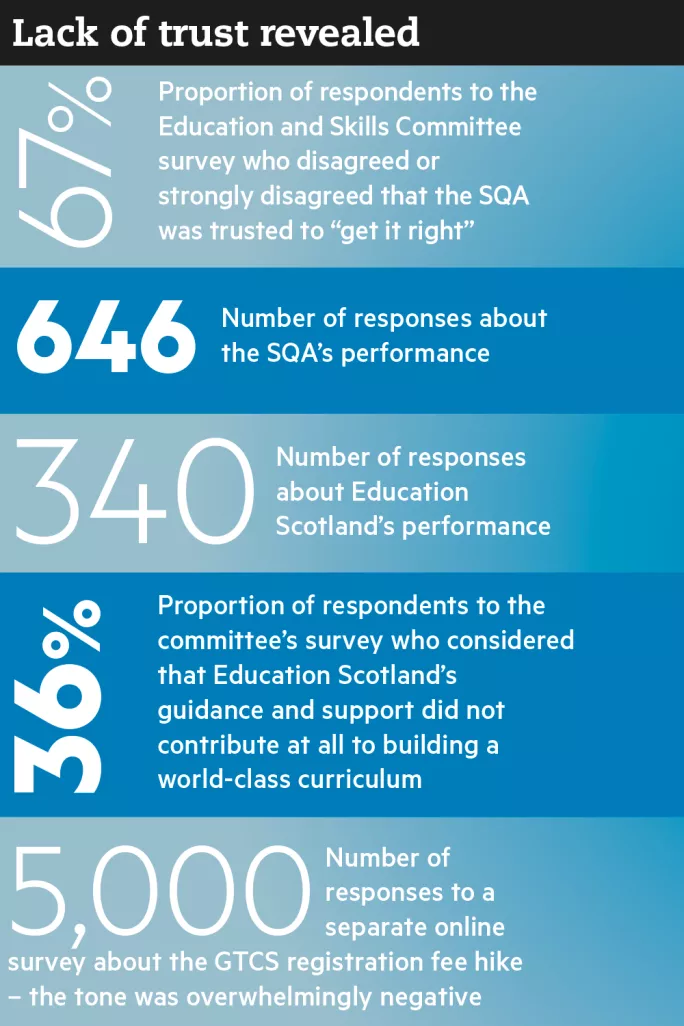Silenced teachers finally ‘give it both barrels’

About a year ago, TESS was left flummoxed. We had covered two learning festivals, a matter of months apart, at which teachers had failed to give then education secretary Angela Constance a good grilling. This was despite her willingness to take questions and the fact that she had not long reintroduced national testing.
Lately, however, amid a groundswell of teacher dissatisfaction, there has been no such reticence to question the establishment.
During a recent investigation by the Scottish Parliament’s Education and Skills Committee, teachers gave key national education bodies “both barrels” - as English teacher and executive member of the NASUWT teaching union, Mike Corbett, puts it. The committee - which published its findings last month - was examining the performance of agencies including exam body the Scottish Qualifications Authority (SQA) and inspectorate Education Scotland (see “Olive branch needed” box, below).
‘Teachers run the risk of disciplinary action if they criticise their employer’
Meanwhile, teachers’ own regulatory body, the General Teaching Council for Scotland (GTCS), encountered a storm of protest last month when it decided to increase its obligatory registration fee.
Corbett says of the backlash against SQA and Education Scotland: “Most of it comes back to poor communication. Either the way advice was framed in the first place was a bit woolly or, particularly in the case of the SQA, something has gone out and then a change has been made, and that hasn’t been communicated effectively.
“Teachers have been very frustrated with all the change, so when they have been given the opportunity to say something, they have used it and given them both barrels.”

Barriers to speaking out
The committee’s report on its findings, Performance and Role of Key Education and Skills Bodies, suggests that it is not always easy for teachers to speak with “candour”.
The document highlights the fact that the bulk of responses received from teachers were anonymous. It says: “The committee is concerned that teachers may feel inhibited from ‘expressing critical and independent views’ as suggested by the Royal Society of Edinburgh.”
In evidence to the committee, the Royal Society of Edinburgh had said: “There is concern that a culture of compliance and conformity in Scottish education inhibits headteachers and teachers from expressing critical and independent views.”
The report goes on to claim that a local authority prevented one of the MSPs on the committee, Fulton MacGregor, from seeking the views of teachers in his constituency.
The authority, North Lanarkshire Council, denies the allegation, saying that it did not put up barriers, but admitting that it did not want teachers engaging with an elected member if this would be “impacting on children during the school day”.
Local authorities are often “heavy handed” when it comes to teachers expressing their views, says Larry Flanagan, general secretary of the EIS teaching union.
“Teachers run the risk of disciplinary action if they criticise the policies or employment practices of their employer,” he adds. “So when it comes to school closures, even if a teacher is a parent, if they are employed by the authority, they are not allowed to express an opinion.
“There absolutely is too much restriction on teachers; some councils can be very heavy handed. It’s a minefield for teachers. I don’t think they can contribute to the debate and it does lead to their voice being quieter than it maybe should be.”

Thousands resist GTCS fee rise
Scottish teachers have reached a tipping point, believes primary school teacher Athole McLauchlan. In a recent blog, he wrote that teachers had “reluctantly lapped up” the changes dictated by national bodies, as well as “constant criticism of our skills and professionalism” doled out in the wake of the latest Pisa (Programme for International Student Assessment) results and the Scottish Survey of Literacy and Numeracy.
But no more. Hence the uncharacteristically furious response from teachers last month when the GTCS increased its registration fee by 30 per cent, from £50 to £65.
McLauchlan started an online survey to seek teachers’ views about the fee hike and received 5,000 overwhelmingly negative responses within hours; almost 8,800 people later signed a petition calling for the increase to be abandoned; and hundreds got in touch with the GTCS to complain (“Teachers vent their fury over GTCS fee increase”, Insight, 20 January).
Meanwhile, the committee received 646 responses to its survey on the SQA’s performance - 71 per cent of which came from teachers. The Education Scotland survey attracted 340 responses, 62 per cent of which came from teachers.
Of course, it has been clear for some time that teachers’ frustration has been mounting, over workload and unnecessary bureaucracy, in particular. Up until September last year, when the mandatory unit assessments were scrapped by education secretary John Swinney, the EIS was taking industrial action short of strike - the first national action in Scotland since the 1980s.
“For us to have got to that point was a reflection of the level of frustration people were feeling,” Flanagan says. The unit assessments, however, will not disappear until the start of the new school year in August, which means “this year is another workload pressure pot”, according to Flanagan.
Also contributing to teachers’ sense of dissatisfaction have been poor pay rises, staff shortages, diminishing support - in areas from administration to educational psychology - and dwindling budgets.
Responding to the GTCS fee hike, one teacher wrote on Facebook of the “erosion in teacher salaries” over the past eight years, “meagre pay increases” and the reduction in funding that had “resulted in every teacher I know supplementing basic school resources at their own expense”.
‘For the EIS to have got to the point of industrial action was a reflection of the frustration people were feeling’
In his blog, McLauchlan adds to this list “the unstoppable momentum towards the death throes of standardised testing and the statutory centralised paternalism of the governance review”.
Lindsay Paterson, professor of education policy at the University of Edinburgh, believes disillusionment with the major institutions of education has been building - albeit slowly - since devolution in 1999.
For its first decade, the Scottish Parliament was happy to let the old institutions run education. But now that serious problems with the system are beginning to appear, it is starting to blame them, Paterson says: “The Parliament has been tentative about challenging things which were established in Scottish life; the unsatisfactory nature of that compromise is becoming evident.”
The willingness of the profession to begin to challenge these institutions feeds into the general sense that “elites are not doing their jobs properly”, Paterson continues. This has led to the UK’s vote for Brexit and the US election of Donald Trump. The rebellion of Scottish teachers is, comparatively speaking, “remarkably polite”, he says.
Nonetheless, many believe it is good to see Scottish teachers showing their teeth: Walter Humes, honorary professor of education at the University of Stirling, has questioned how our system can improve without critical thinkers prepared to question it.
With that in mind, we look forward to this year’s Scottish Learning Festival.
You need a Tes subscription to read this article
Subscribe now to read this article and get other subscriber-only content:
- Unlimited access to all Tes magazine content
- Exclusive subscriber-only stories
- Award-winning email newsletters
Already a subscriber? Log in
You need a subscription to read this article
Subscribe now to read this article and get other subscriber-only content, including:
- Unlimited access to all Tes magazine content
- Exclusive subscriber-only stories
- Award-winning email newsletters